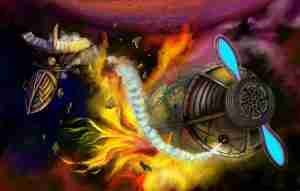
When I first set out to write Operation Cosmic Teapot, I did so to entertain myself. I wanted to write a book that would make me laugh while allowing me to look into a number of philosophies. OCT was the result. More recently, I started thinking about writing a reader’s guide because while I did try to layer the book so that it would be amusing to both non-philosophers and philosophers, it occurred to me that maybe some people would like to know just what the heck I mean by one thing or another. The funny thing is that I’m a post-modernist in most respects, so I do believe that the meaning you get from reading the book is the right meaning. Still, there are a ton of obscure references splattered in each chapter and so I figured that it would be fun to give a DVD-type commentary for the book.
The book is rooted in history, philosophy, and theology with generous liberties taken at every turn. I’ll help you sort out what is fact, historical, and fiction in this reader’s guide. Plus I’ll give some insight into my thinking while I was writing.
Now, before we even get into the chapters, it is important to note that for years, this book was called Heaven Inc. In fact, I even made a couple of shitty cartoons about the gods in the call center before the book was finished. After looking around the internet, though, I found a clothing line, a webseries, and even another book with the title Heaven Inc. After a great deal of consideration, I changed the title. It took a solid six months to finally settle on Operation Cosmic Teapot.
The title comes from two things. First, it is Nietzsche’s code name for hunting down the Norse Gods in the novel. Every good war-time operation needs a nifty code name, so I chose Operation Cosmic Teapot. In the more meaningful sense, though, cosmic teapot (sometimes called the celestial teapot) is taken from Bertrand Russell’s analogy about the burden of proof when discussing the existence of God. The analogy, which appeared in a 1952 issue of Illustrated magazine, goes like this:
“Many orthodox people speak as though it were the business of sceptics to disprove received dogmas rather than of dogmatists to prove them. This is, of course, a mistake. If I were to suggest that between the Earth and Mars there is a china teapot revolving about the sun in an elliptical orbit, nobody would be able to disprove my assertion provided I were careful to add that the teapot is too small to be revealed even by our most powerful telescopes. But if I were to go on to say that, since my assertion cannot be disproved, it is intolerable presumption on the part of human reason to doubt it, I should rightly be thought to be talking nonsense. If, however, the existence of such a teapot were affirmed in ancient books, taught as the sacred truth every Sunday, and instilled into the minds of children at school, hesitation to believe in its existence would become a mark of eccentricity and entitle the doubter to the attentions of the psychiatrist in an enlightened age or of the Inquisitor in an earlier time.”
In the novel, however, I’m not really setting out to prove or disprove God or gods. I’m just having some fun with the roles of gods and their interactions with people. I just really liked the way that the title rang. Okay, maybe it’s a little more relevant than that but, you know. What I hope the title does is set out the feeling that it’s going to be humorous, satirical, and philosophical. I mean having Nietzsche’s head roll out of a teapot like a genie kind of sums up the book. That isn’t to say that you should merely admire the cover, though. There are a few good things between page 1 and 250.
Buy it Now! Amazon Smashwords Barnes and Noble iBooks Kobo





